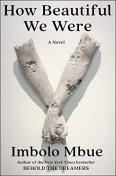
by Imbolo Mbue
Hardcover- $20.99
Click on the ORANGE Amazon Button for Book Description & Pricing Info
Overall rating:
How would you rate this book?
Member ratings
How Beautiful We Were: A Novel, Imbolo, Mbue, author; Prentice Onayemi, Janina Edwards, Dion Graham, JD Jackson, Allyson Johnson, Lisa Renee Pitts, narrators
Once upon a time, in a place called Kosawa, Africa, the villagers lived happily with what little they had; they were content. Their simple huts without modern technology satisfied their needs. Neighbors helped each other. Children played together in a clean environment. They did not covet their neighbor or their neighbor’s belongings.
Then, as the world grew more advanced, one country made a business deal with an African leader to have his warriors capture the members of other tribes. It was a lucrative business for both native and foreigner. The foreigners then sold the captives as slaves to other foreigners. Soon, others realized the villagers were vulnerable and corporations made business dealings with the government. Corruption prevailed. The villagers were forced to work the factories of these unscrupulous businessmen so that they and the government could prosper. The villagers, however, reaped little or no benefits. Brutal soldiers kept them in line. There were no consequences for anyone but the abused villagers. The corporations and governments were maximizing their profits as they destroyed the way of life of these happy villagers. They were poorly educated, were very superstitions and believed in magic.
Soon, industrial waste products began to pollute the water and the air. An American oil company, Pexton, provided jobs for some villagers. The man who was the head of Kosawa, worked for Pexton. His family did not live in a hut, nor did they drink well water. So, when villagers began to fall ill from the contamination caused by Pexton’s industry, they were not affected. As more and more of the villager’s children fell ill and succumbed to their illnesses, the villagers began to grow suspicious. Why did the head of the village fare better? Why did he have bottled water? Why did those who lived in “The Garden” seem healthier? The American workers lived in “The Garden” in brick houses and drank bottled water. Was the oil company responsible for their troubles? Before they came, they did not have these illnesses. They brought their concerns to Pexton and their government. Both reassured them that they were doing nothing wrong and things would get better. As things grew worse instead, desperate villagers took desperate actions.
The villagers grew angrier and more frustrated with their lack of progress and the increasing illnesses. They were helpless to prevent their children’s illnesses. Those in charge would not provide them with the medication they needed. The villagers rebelled. They wanted to force those in charge to stop despoiling their environment, but the consequences turned out to be disastrous. The villagers were powerless. The government, the military and the corporations were corrupt and did as they pleased. The repercussions were brutal. The villagers had believed that they could work out a solution peacefully, and they believed that would all get along. The corporations and government believed in control. Soon, the situation grew out of control. Time passed as the villagers tried to return to some kind of a normal life. When one of the young children, Thula, goes to America to study, her eyes are opened to the corruption in the world. She wants to help Kosawa and bring justice to the villagers, but after decades, her efforts prove fruitless. The forces of evil remain in charge until there is nothing left of their village.
In this beautifully written fantasy, the author deftly exposes the corruption of government, the military and corporations, as motivated by power and greed, they slowly destroy those weaker, laying waste to their environment and to the population, without regard for the consequences. Superstition and a lack of education made the villagers particularly vulnerable, and so they were easy prey. They believed in magic, were tragically naïve and unsuspecting, making them ripe for the abuse of those who were more powerful, greedier, and more unscrupulous.
Book Club HQ to over 88,000+ book clubs and ready to welcome yours.
Get free weekly updates on top club picks, book giveaways, author events and more








